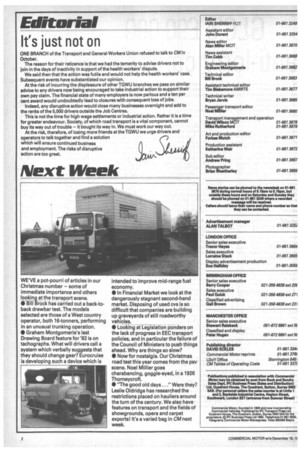E ditoria l aria_
Page 2

If you've noticed an error in this article please click here to report it so we can fix it.
It's just not on
ONE BRANCH of the Transport and General Workers Union refused to talk to CM in October.
The reason for their reticence is that we had the temerity to advise drivers not to join in the days of inactivity in support of the health workers' dispute. We said then that the action was futile and would not help the health workers' case. Subsequent events have substantiated our opinion. At the risk of incurring the displeasure of other TGWU branches we pass on similar advice to any drivers now being encouraged to take industrial action to support their own pay claim. The financial state of many employers is now parlous and a ten per cent award would undoubtedly lead to closures with consequent loss of jobs.
Indeed, any disruptive action would close many businesses overnight and add to the ranks of the 5,000 drivers outside the Job Centres.
This is not the time for high wage settlements or industrial action. Rather it is a time for greater endeavour. Society, of which road transport is a vital component, cannot buy its way out of trouble — it bought its way in. We must work our way out. At the risk, therefore, of losing more friends at the TGWU we urge drivers and operators to talk together and find a solution which will ensure continued business and employment. The risks of disruptive action are too great.




































